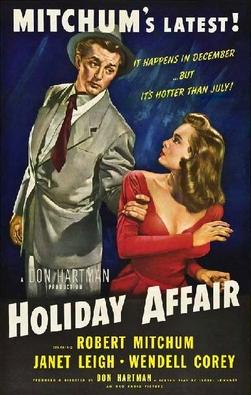In The Matter Of Robert Mitchum-Redux-Janet Leigh and Robert Mitchum’s “Holiday Affair” (1949)-A Film Review
DVD Review
By Leslie Dumont
Holiday Affair, starring Janet Leigh, Robert Mitchum, Wendell Corey, 1949
In 2017 Sam Lowell a fellow writer in this space and who before his retirement from the day to day operations of the film review department had been the chief film reviewer here (and at Progressive Nation and American Film Gazetteer respectively before that) literally went crazy commemorating the centennial of the birth of the well-known 20th century actor Robert Mitchum. Sam’s take on Mitchum centered on his durability as an actor having been featured in over one hundred films in his long and honorable career and in his best roles his durability in seeking a little rough justice in this wicked old world (Sam’s term) with a build built for heavy lifting, for taking a punch or seven or a couple of slugs if it came to that. What in those days, maybe was known too although I haven’t seen the term used much recently as called “beefcake” complete with maybe not film relevant bare chested shots of his barren chested physique to set the female audience’s hearts a-flutter (mine too when Sam and I watched a few films in 2017 as part of the retrospective Sam did on Mitchum. He most famously and creditably showed that durability in films like the classic Out Of The Past with Jane Greer where he got twisted in a knot trying to deal with a wanton gun-simple femme and yet died with a smile on his face when things went south on him.
Naturally in a career and at a time when studio contracts were the norm hunk, yes, hunk Robert did a number of films which did not display that durability and that chest and the film under review Holiday Affair is one of them. In this one Robert playing a guy named Steve is kind of a drifter after World War II like a lot of guys then and now who had trouble settling down to the nine to five life after years of combat. Moreover he had a dream of building boats out in his native California. Unfortunately that dream career was on hold since he was slumming along as a toy department salesman in a large New York City department store at Christmas time (hence the “holiday” part of the title the “affair” part is not what you think but a come on for the unwary) when the action begins. From there the thing turns into another variation of the classic tried and true boy meets girl formula that has been a hallmark of half the films ever produced in Hollywood land.
Enter Jane, played by Janet Leigh a comparison shopper for a rival department store who is under orders to buy a train set in said toy department but who is rather ham-fisted about the whole thing so Steve know what she is up to, especially when next day she shows up to return the item (after emotionally tearing up her young son Timmy who thought that was a present for him but which working mother war widow could not afford). He should have reported her to his floorwalker but after she gave him a sob story about being the sole support of young son Timmy he fell on his sword and did the honorable thing and gave her a refund. Which cost his job.
That could have been the end of the story and nobody would have cried but naturally they meet again and Steve starts putting the classic moves (in those cinematic days “classic moves” play) and the full press. Problem, Carl problem, played by Wendell Corey a staid if stand-up lawyer who can offer Jane stability and upward mobility if not reciprocal love on her part since she is still in a fog over the loss of her late husband. The threesome (not ménage) play out their respective roles with Carl finally seeing the writing on the wall that she only has eyes for Steve (without inspecting the beefcake since there is not one such scene in this one). After some indecision and a serious egging on by Timmy who is indifferent to Carl but who goes for Steve in a big way especially after he bought him that coveted train set Jane chases him down on a train heading west to California where he will finally pursue that boat-building dream. You know thought Sam is right Robert was built for heavy-lifting and an occasional punch or slug this gooey good guy stuff is not what made his career. Them is the facts, Jack.
